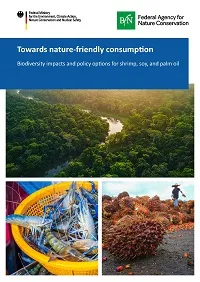Towards nature-friendly consumption. Biodiversity impacts and policy options for shrimp, soy, and palm oil
Beschreibung
The three case studies reveal the immense land requirements of EU imports. They show how EU demand drives the loss of biodiversity-rich ecosystems in the Global South: From the clearing of coastal mangroves for shrimp ponds to the conversion of tropical savannas and forests into soy fields and the destruction and drainage of rainforests and peatlands for oil palm plantations.
The severe impacts of European consumption on biodiversity are the result of political and economic decisions - which also offer leverage for a shift toward nature-friendly consumption. The study demonstrates how the EU can significantly reduce its biodiversity footprint through coordinated measures aimed at global justice. To do so, regulatory, fiscal, marked-based, voluntary, and trade policy instruments should be combined.
The publication was developed by the Institute for Ecological Economic Research (IÖW) and the Institute for Energy and Environmental Research (ifeu) Heidelberg, as part of a project supported by the Federal Agency for Nature Conservation (BfN) with funds from the Federal Ministry for the Environment, Climate Action, Nature Conservation and Nuclear Safety (BMUKN).
